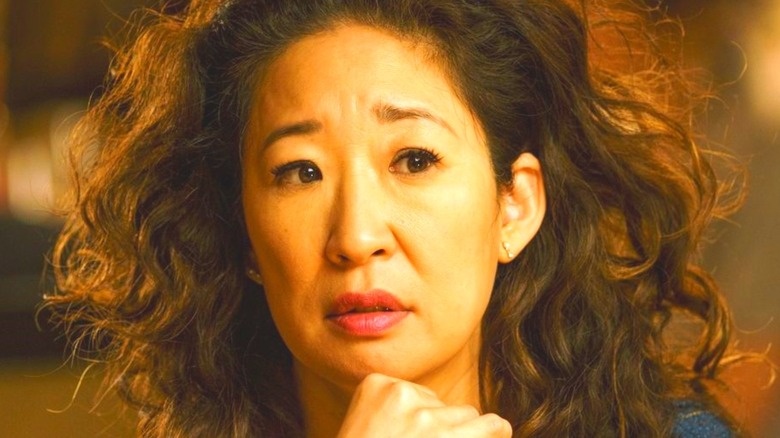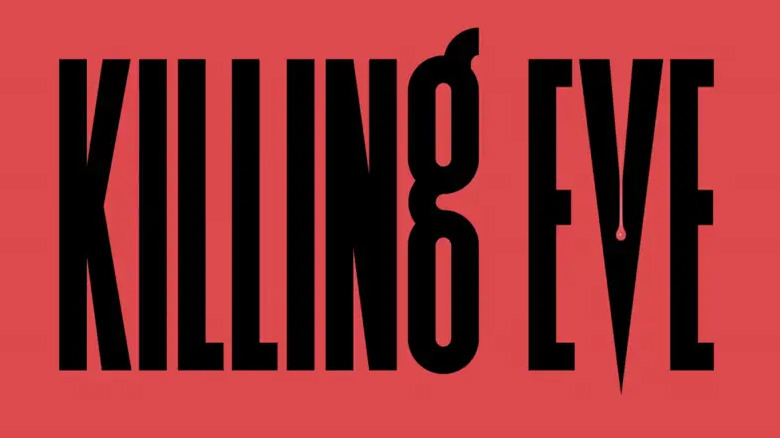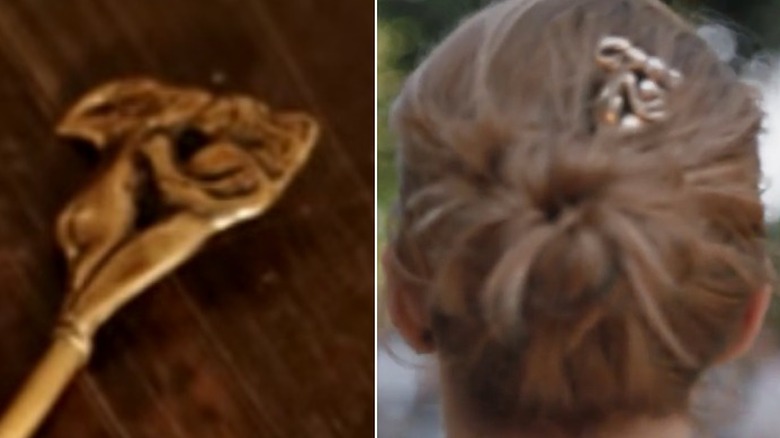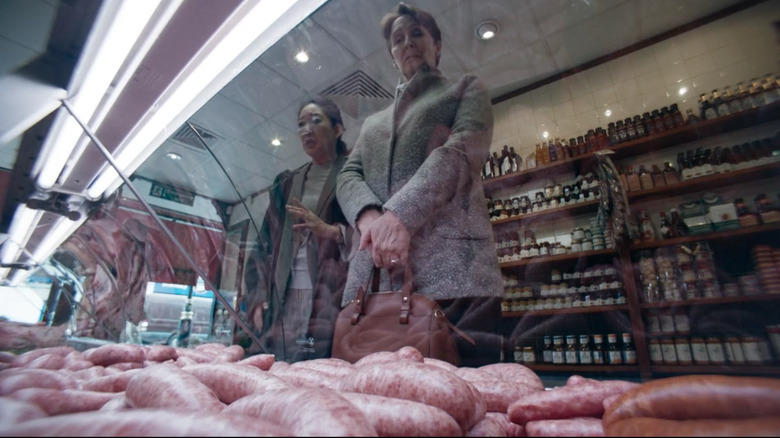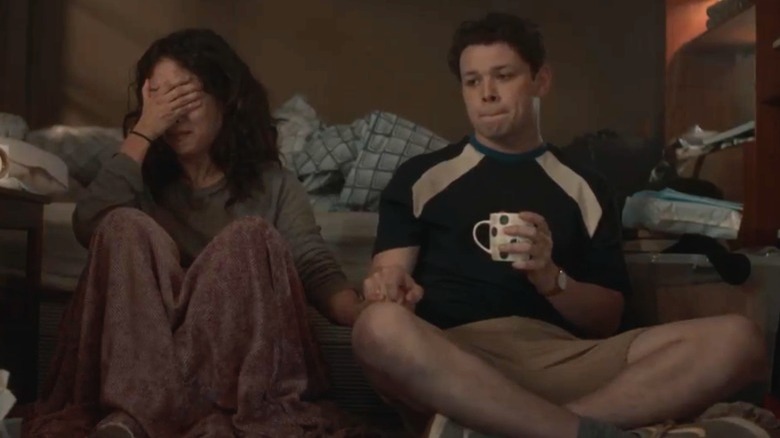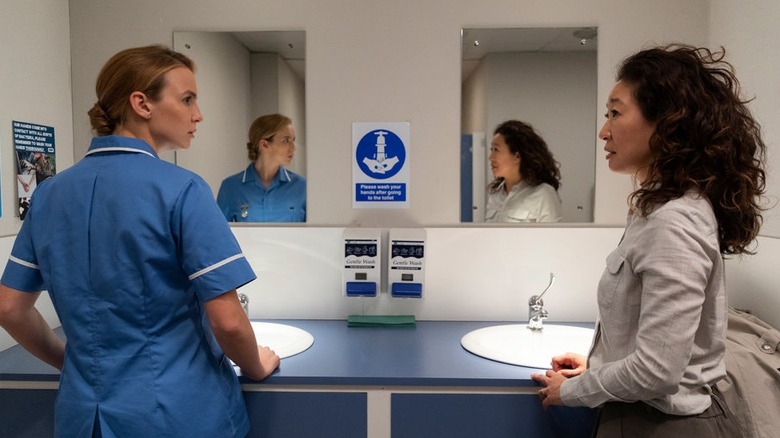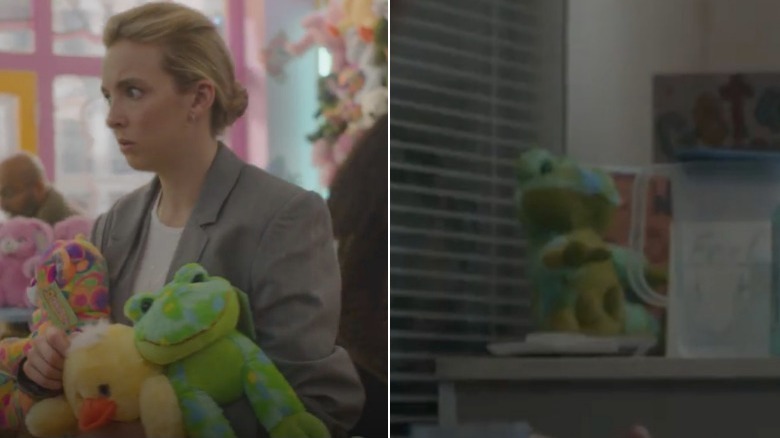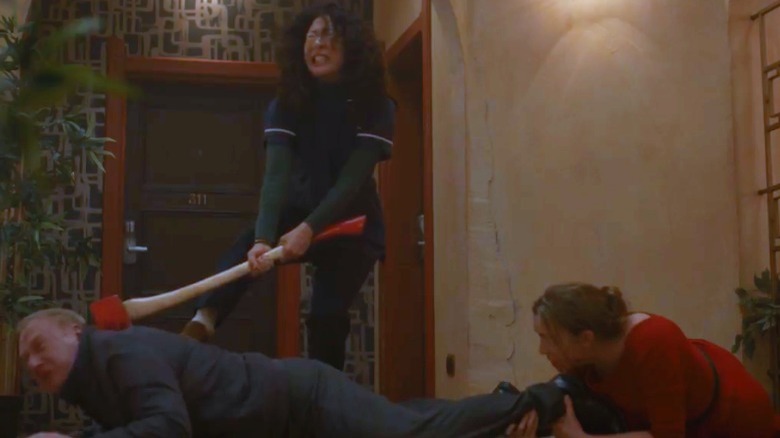Things You Only Notice In Killing Eve After Watching It More Than Once
The following article includes descriptions of graphic violence and death.
When it premiered in 2018, "Killing Eve" became one of the most critically acclaimed shows on television overnight. Among its many accolades — which include Golden Globes, Screen Actors Guild Awards, and BAFTA's — the show has also earned 19 Emmy nominations, with star Sandra Oh making history as the first Asian woman to be nominated for a Best Actress Emmy in a Drama (via People).
Created by Phoebe Waller-Bridge, who also helmed "Fleabag," the story follows Eve Polastri (Sandra Oh), an inexperienced MI6 agent who finds herself hunting a female assassin named Villanelle (Jodie Comer). As their pursuit spans the globe, we watch their mutual interest in each other grow into a joint obsession.
Over the years, the show has seen many upheavals, as highlighted by The Hollywood Reporter. Each new season has replaced the showrunner and head writer with a different woman, leading to a more disjointed overall story. After a disappointing reception for Season 3, it was announced by Deadline that Season 4 will be the last in the series. Now that the game of cat and mouse between these two protagonists is coming to a close, let's take a look back at all the little details we missed during their thrilling chase the first time around — and their potential deeper meanings.
Killing Eve plants clues with changes in the opening titles
For the first two seasons, the show's title card has a drip of blood fall from its letters, alternating between the N, V, and K. The only two episodes that showed the blood drop from the bottom of the letter V, instead of the top, were in Season 2 episode 4, where a man is hung upside down and gutted, and in Season 3 episode 1, when someone is thrown off of a building. Fittingly, both incidents are linked to vertigo.
Beginning with episode 2 of Season 3, the show started using different opening sequences that are more reminiscent of inkblot tests rather than blood droplets. This also signaled the shift in onscreen captions, which now included people's names and phrases, not just locations. This change pointed toward the overall tonal shift for Season 3, where the psychology of the characters takes center stage over the spy thriller elements we'd experienced thus far.
The title itself also holds a double meaning, referring both to the attempts made to kill Eve, while also alluding to her becoming a killer herself: a Killing Eve versus a Non-Killing Eve. Similarly, Villanelle's name also has multiple interpretations. For one, villanelle is a form of poetry, and the book "A Companion to Poetic Genre," edited by Erik Martini, points out author Philip Jason's explanation of it as a way to "to deal with one or another degree of obsession." Secondly, it can also be seen as a combination of the word villain and the French word elle meaning she, alluding to mean villainess.
Fans on Twitter have also pointed out that combining the names of the two main leads would spell out Eve-Elle, or Evil.
Villanelle's choice of accessories is not only beautiful but deadly
Much has been said about the use of fashion and accessories in the show (via Vanity Fair). Not only does the show's wardrobe have aesthetic appeal, but it also shapes the brutality of its assassin. For example, in the first episode, Villanelle sneaks into a lavish party at a mansion and kills a Mafia boss with a hairpin. She injects the poison inside the pin by stabbing it directly into his left eye. Subtly, the hairpin itself shows off the image of two women in the middle of an intimate embrace. An apropos metaphor for how Villanelle operates: sensual and deadly.
She also slips a gift into Eve's purse, unnoticed, in Season 2 episode 3 — lipstick with a razor blade hidden inside. When Eve goes to use it and cuts her lip, instead of being incensed or even annoyed, she is intrigued by the gesture. Her expression implying she accepts and appreciates the wound as a twisted kiss from her psychotic admirer.
Another piece of jewelry, one which was created specifically for the show by Jessica De Lotz (as described on her website), is a two-piece ring which says "I ♥ U" when the pieces are joined and has "yours" and "mine" inscribed on either side. Villanelle wore the ring after being given a contract to kill Eve. We obviously never see the ring or the inscription clearly, but it does foreshadow the ending of the second season, with Villanelle screaming "I love you," and "You're mine," before shooting Eve.
However, in perhaps the most disturbing act of accessorizing, in Season 1, Villanelle takes the dress she gifted Eve and puts her next victim Frank Haleton (Darren Boyd) in it, after killing and castrating him.
Killing Eve makes many references to sausages
This gruesome castration brings us to another phallic symbol on the show — sausages. As writer Hanh Nguyen wrote for IndieWire, half the episodes in Season 1 devoted at least some screen time to the tubular meat products. Though their presence is not as prominent after the first season, their use as a means to express both savagery and affection persists throughout the series.
Right after the castration of Frank, we cut to a scene of Villanelle happily frying sausages, paralleling the two sorts of butcherings. This is also, notably, not Villanelle's first castration. In Season 1 Episode 5, her file reveals the quantity of "Grievous bodily harm including castration" at four. Then, in Season 2, episode 4, a painting depicting the 1672 lynching of two aristocrats by Jan de Baen inspires her for an upcoming kill. Looking at the dismembered figures in the portrait she remarks, "They look like bacon," then uses a similar method to mutilate her next victim. Her tactic mirrors the form of public humiliation in the painting — reducing powerful men to casings of meat.
Contrastingly, sausage is also connected to affection in the series. When a frantic Eve meets with her MI6 superior Carolyn Martens (Fiona Shaw) at a butcher shop, Carolyn calms her by saying, "Take a minute. Look at the sausages." Later in the season, when Eve catches Carolyn returning from a sexual liaison, they proceed to join her Russian lover Konstantin Vasiliev (Kim Bodnia) for a sausage breakfast.
Parental affection is similarly expressed through meat, with Konstantin lovingly calling his daughter "sausage" and before Carolyn's son Kenny Stowton (Sean Delaney) is murdered, one of the last meals they share together in the Season 3 premiere is fish and chips with battered sausage.
Kenny remained an ethical touchstone throughout Killing Eve
Kenny Stowton (Sean Delaney) is not only the son of MI6 powerhouse Carolyn Martens, but also a computer genius who helps Eve with her cases. His character's shocking death is foreshadowed in Season 2, episode 3, when Konstantin asks Carolyn, "What would you do if you could never see Kenny again?" to which she remarks, "I'd be fine." Predictably, she does appear to be very composed overall and outwardly stoic after his death.
Kenny was arguably the ethical touchstone of the show, sometimes being the only person willing to stand up to his superiors about unnecessarily dangerous and morally dubious assignments. He continued to remain a source of support and friendship to Eve during her lowest point, after they both quit MI6.
Additionally, his adorable awkwardness added a layer of levity which helped balance the show's more gruesome aspects. Some running gags involving Kenny only paid off later. For instance, in Season 1, he once nervously asked Eve after he exited the bathroom, "You weren't listening, were you?" This comment is clarified after his death in Season 3, when his girlfriend reveals, "He used to sing to himself when he was on the loo." Basically, Kenny was nervous that day with Eve because he was afraid she might have heard him singing on the toilet.
Key events in Villanelle's life take place in bathrooms
In Season 1, episode 5, when Villanelle's victim pleads that she kill him in the bedroom instead of the bathroom, she retorts, "I have a thing about bathrooms actually." This comment makes complete sense when you think about the multiple key incidents in her life that occur in bathrooms.
Perhaps one of the most impactful is when she first meets Eve in a hospital bathroom, during the series premiere, and they speak for the first time. A few episodes later, they have their second conversation in yet another bathroom, where Eve is hiding after Villanelle breaks into her house. In Season 2, after Villanelle feels ignored by Eve, she starts a fight in a nightclub toilet stall and then has one of the most genuinely emotional moments we ever see, as she cries in her hotel bathroom later that night.
There are also numerous assassinations she conducts in bathrooms. In Season 1, she kills an asthmatic woman in the ladies restroom using a toxic perfume. A few episodes later, when her target is in prison, she befriends an accomplice to help her while they are both on bathroom cleaning duty. In Season 2, an unhinged man traps her in his house while she is injured, so she is forced to raid his bathroom medicine cabinet and kills him by shoving a toilet brush down his throat. In Season 3, when she's trying to train a new assassin who botches a kill and ends up in a brawl with the victim instead, she shoots them both in the head while they are... yes, in the bathroom.
Villanelle effortlessly disguises her true nature
The reason Villanelle is so good at being an assassin isn't just because of her vicious ability to take a life, but also her expertise at being able to take on multiple personalities, accents, languages, and appearances. At the beginning of Season 2, when a disfigured teenager tells her, "I want to be normal," she replies, "I'm not normal, you know." To which he responds, "But you look normal."
That is Villanelle's greatest talent — the ability to seem normal.
In Season 1, episode 2, when she is on the treadmill, she hears a woman laugh on the radio and parrots the sounds while working out. A few hours later, when she is on a date with her neighbor Sebastian (Charlie Hamblett) she uses the exact same laugh she had practiced earlier, demonstrating her talent for impersonation.
Besides her personality, she also transforms her physique as needed. When the Polish girlfriend of one of her targets describes the killer as "flat-chested," we see Villanelle return home and remove a minimizer bra, which was part of her disguise, and one of the ways Eve tried to identify her in the MI6 database.
Her identities are so distinct that in Season 2, she is able to ingratiate herself with the moneyed siblings Amber (Shannon Tarbet) and Aaron Peele (Henry Lloyd-Hughes), even though they had been shown her picture earlier as a possible murder suspect. The picture they saw of her in her mugshot, and the version of herself she presents to them, are so disparate that neither even considers they might be the same person.
Villanelle's feelings for Eve are hinted at in clever ways
Though they have every reason to hate each other, Villanelle appears to genuinely care about Eve. Whether this caring is part of some sick obsession, or a misguided compulsion, the end result is that she is devoted to Eve, in her own troubling and psychotic way.
There are numerous small gestures that Villanelle makes to show her care and consideration. For example, when she steals Eve's suitcase in Season 1, episode 3, and goes through all her belongings, she finds a cream for yeast infections among the belongings — and remarks, "Poor baby!" When she later returns the suitcase, and replaces all the items inside with expensive clothes and perfumes, she also remembers to include yeast infection cream.
Similarly, when Eve's long-suffering husband Niko is in the hospital — after being stabbed with a pitchfork — in Season 3, you can see a toy green frog in his hospital room. If you watch carefully, you'll see that Villanelle was holding the same frog in a previous episode. The clear implication is that she sent it to Niko, knowing how terrible Eve must be feeling.
There are also visuals in the show that reinforce Villanelle's feelings. For example, in Season 3, after the two fight — and then share their first kiss on a bus — there is a poster behind Villanelle with hearts on it.
The influence of Villanelle on Eve's behavior
As we prepare for Season 4, it's become clear that Eve and Villanelle's journey has had a profound impact on their self-identities.
Eve has become more ruthless, obsessive, and merciless. This is symbolically demonstrated by the fact that every time Eve does something akin to Villanelle, she lets her hair down. For instance, she loosened her hair right before shattering the glass at a bus stop, and she also took it down when putting on one of the dresses Villanelle gifted her. Eve's hair was similarly untied when she stabbed Villanelle, as well as when she hacked a man to death with an axe. This goes back to the show's beginnings: the first thing Villanelle ever said to Eve is that she should wear her hair down. Thus, the act visually displays Eve's transformation in the series.
Villanelle's evolution comes in the form of uncharacteristic compassion. Before Season 3, she never once showed mercy, but after meeting her family, she spares her two brothers lives and gives them money before setting fire to her family home. She also doesn't kill one of her targets, instead telling him to run. For Villanelle to leave behind a target, let alone a witness, is in stark contrast to her behavior earlier on, when she killed a nanny for no discernible reason.
In Season 1, episode 5, Villanelle told Eve, "I don't want to do this anymore" — but at the time, she was being manipulative and insincere. More recently, in episode 6 of Season 3, she says the exact same line again, while lying on a bathroom floor, but this time, she's completely genuine and vulnerable.
Unfortunately we'll have to wait until 2022 to see how Eve and Villanelle's relationship is finally resolved.
